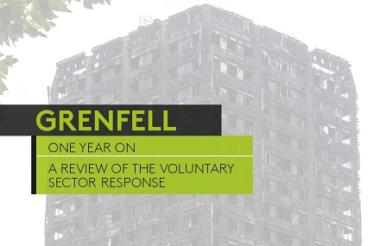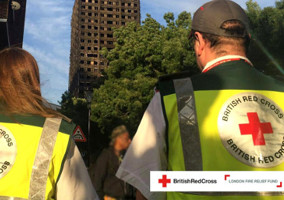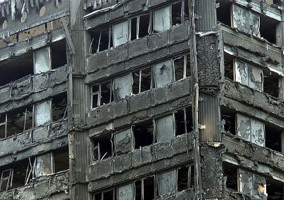A report on the charity sector’s response to the Grenfell tower fire last June says there was a lack of coordination between organisations on the ground in the immediate aftermath.
The report Grenfell: One Year On - a review of the voluntary sector response by Muslim Aid says overall the response of the voluntary sector to the immediate needs of local people has been widely praised but it says more could be done to better prepare for future emergencies.
It says there was a lack of leadership in the days following the fire, particularly from the local authority, from whom it was “almost entirely lacking”.
The report says the voluntary sector “did not come together as one either”, with local charity the Kensington and Chelsea Social Council only managing to arrange a meeting more than a week after the fire.
It says some local voluntary sector leaders found it difficult to contact one another on the first day, with bicycles being used to convey information between centres.
The report says that links between faith-based charities have deepened since the fire, including a six-month inter-faith event at St Paul’s Cathedral.
It recommends that more effective mechanisms need to be developed to better harness the collective capabilities of the voluntary sector, including those offered by faith organisations, in emergency response.
Muslim Aid’s chief executive Jehangir Malik said: “I would have expected this chaos in a developing country, because almost always there is poor infrastructure. I honestly thought we had better disaster preparedness and response systems here in the UK.
“We are now asking for lessons to be learned and for greater coordination of the voluntary organisations with local authorities, including as part of national emergency response structures.”
‘More diversity needed’
The report says that while many Muslim charities reflected the make-up of the North Kensington community affected by the Grenfell fire, larger organisations were “less attuned”.
Mike Adamson, chief executive of the British Red Cross, one of the larger charities that provided support in the wake of the Grenfell fire, wrote in a blog last year that his organisation’s volunteers, staffing and leadership were “nowhere near as diverse as we need to be”.
The report recommends that in future those steering the voluntary sector’s thinking and practice need to ensure that charities “better reflect the diversity within British society”.
“Experience from elsewhere demonstrates how different communities can be differently affected by the same types of disaster, and unless their realities are embraced, the road to recovery can be a tortuous one,” it says.
‘Charities should speak out’
The report says that there is a “strong sense of injustice” felt by local residents, particular towards the local authority.
While it says charities’ abilities to address these grievances through their own service provision is limited, residents would like charities to advocate for them.
It says: “There is a shared sense among residents’ organisations that the voluntary sector should be doing more in this regard.
“Fair or not, given uncertainty about the motives of at least some in the sector and the belief that not everyone is being entirely selfless, it is important that voluntary organisations give their backing to the voices and grievances of the people they exist to support.”
Ongoing support
A number of new organisations were created following the fire. At one point in 2017 there were 280 organisations online with "Grenfell" in their name compared to only three prior to the fire.
The report says some are dubious about the added value of some of the new organisations' work, described by one residents' representative as "yoga for Grenfell".
However, the report says there will be a great need for further support to local charities in the coming years, with an increased need for mental health support in particular in the area.
One of the few guaranteed sources of income sits with the Kensington and Chelsea Foundation, which has retained £1.6m which it intends to invest in initiatives to improve the lives of residents over the next two to three years.
But it says: “There is clearly a need for continuing support to agencies in the recovery stage, including faith organisations of all hues, which are often short of resources.
“Funding needs to be supplemented by other forms of capacity strengthening support to help agencies define their individual or collective roles or strategies in continuing to support affected people.”
|
Related articles












